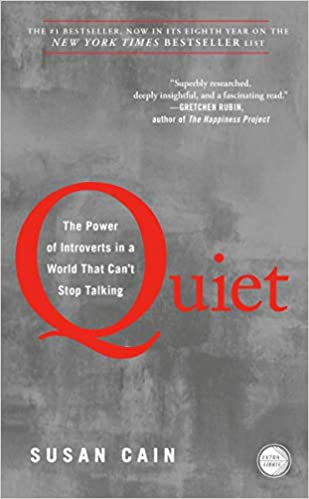Without even trying, introverts can unsettle extroverts. They give off an aura of being mysterious as they tend not to show reactions or telling facial expressions. And in business, that’s precisely what you need to be successful.
When people think about success, they believe that extroverts are more likely to succeed than introverts. People seem to think the “fact” that extroverts are destined for more success because they are associated with the more traditional aspects of business such as public speaking, networking, and negotiation. Extroverts are seen as confident leaders.
But what if we told you that the world’s current richest man is an introvert who values silence? And that there is a long list of silent people like him who have achieved astronomical success? Beyonce– yes, Queen Bey– is a proud introvert off stage. It’s because all these people appreciate the power of silence– and they harness it.
Bill Gates, the co-founder of Microsoft, who is worth billions of dollars, started as a solitary introvert.
In his own words, “If you’re clever, you can learn to get the benefits of being an introvert, which might be, say, being willing to go off for a few days and think about a tough problem, read everything you can, push yourself very hard to think out on the edge of that area. Then, if you come up with something . . . you’d better learn what extroverts do, you’d better hire some extroverts and tap into both sets of skills.”

Quiet
by Susan Cain
⏱ 12 minutes reading time
🎧 Audio version available
They’re Great Observers
Keep an eye on the introvert in the group during a conversation. They’ll likely say very little, preferring to sit back and observe.
You’ll find them taking in all that is being said, mentally cataloging it for later. They’re soaking in all that knowledge – and you know how that works out in the business world? It’s a famous trait of entrepreneurs.
It was Susan Cain, an American lecturer and author of “Quiet: The Power of Introverts in a World That Can’t Stop Talking” and its sequel, “Quiet Power: The Secret Strengths of Introverts,” who summarized this idea, saying that quiet people aren’t anti-social; they’re just “differently social.”
That means that a quiet person isn’t necessarily a wallflower, and they’re also not judging people when they take a step back from a conversation to observe.
They’re Always One Step Ahead
A silent person is one step ahead. That is why they stand out when it comes to looking for someone with that quality. Not only that, but this person probably has a plan B, a plan C, and an entire alphabet’s worth of plans in mind. Their silence allows them to take more time to process what’s happening and take in more information.
This is why, when faced with a problem, they will often take time to think things through– enough time that they can come up with a strategy.
They also generally think more deeply, and this means that their strategies, tactics, and plans are more effective when followed through.
So quiet people, introverts, have a critical habit that extroverts don’t have. And it’s that they never jump into ideas or to conclusions without careful thinking.
That anxious part of an introvert that makes them want to avoid feeling more anxiety and frustration? It’s also a trait all successful people have. It makes them plan for any potential risk in order to deal with it.
They’re Phenomenal Listeners
We have established that quiet people are great observers, so it’s obvious that they’re great listeners. Of course, this doesn’t mean that people who like to talk more aren’t good listeners as well.
And not only that, but quiet people are comfortable with silence. These are the kind of people you can sit with at a dinner table, enjoy a delicious meal with, and not feel like you have to talk about the weather to fill the silence. They can communicate with more than just words. Their silence is a tool.
Silence is nothing to be ashamed about, and it’s not something that should be avoided.
They Add Value When They Speak
You know what Plato said, “Wise men speak because they have something to say; Fools because they have to say something.”
When a silent person finally speaks, you and everyone else in the room know that they have something important to say. Someone who doesn’t add value to the conversation doesn’t sound very successful, do they?
People around them, even in a corporate environment, know that this introvert won’t just jump into a conversation or argument for the sake of it.
When they speak, what they are adding will be coming from a logical point of view and beneficial for the topic.
Because of this, and the rarity of it, quiet people are likely to have decisions go in their favor. Or at least, their opinion will be carefully considered and listened to.
They’re Creative
There are entire worlds inside each introvert’s head. Their imagination is loud, bright, brilliant, and most of all, very, very creative. It’s because they spend more time in their heads rather than talking to other people that they have cultivated this trait more than others.
And that’s an essential ingredient for success.
Leave an introvert for a few moments, and you’ll find them coming up with creative ideas, figuring out theories, and generally inventing and being innovative. When it comes to business, being creative is linked to marketing, inventing, and just about everything else.
People Trust Them More
It’s a fact that people tend to trust or take comfort in silent people. You know that they exhibit great self-control, and their silence points to their ability to keep confidential information and secrets under wraps.
Who is more likely to spill the beans on your secret? The introvert? Or the person who announces everything about their personal life? This introverted trait leads to success and moving up the ranks of a company.
They’re Selective About Who They Keep Around
If there is one thing nearly all quiet people share, they are very selective about who they keep around, who they befriend, and who they consider untrustworthy.
This is because of all the observing and listening they have been doing, so you know that they keep only the best people in their immediate circle.
Quality over quantity is their motto when it comes to their social lives. This is beneficial for both their personal and professional lives, and it helps create more profound and more meaningful relationships.
This is also the part where the online world comes in. Strangely enough, and wonderfully enough, introverts and quiet people tend to thrive online. Online communication and networking allow introverts to take an extra moment to think and reflect.
Are you not fully convinced? Take Mark Zuckerberg, for example. Even now, while he’s a billionaire CEO, COO Sheryl Sandberg once described him as “shy and introverted, and he often does not seem very warm to people who don’t know him, but he is warm.”
Zuckerberg didn’t try to change himself. Instead, he chose to surround himself with people who saw and complemented his strength. You can find Elon Musk doing the same. Still, he was able to build charisma through this introversion. Both are wildly successful billionaires with thriving businesses and successful personal lives.
Related: Self Esteem – Understanding & Fixing Low Self-Esteem
They’re Incredibly Self-Aware
Another reason why people with a silent nature are successful is their amazing sense of well, self-awareness. You can guarantee that they are perfectly aware of their shortcomings, their talents, and what they’re capable of.
Self-awareness isn’t the same as self-consciousness. When it’s said that silent people are self-aware, it means that when they notice a shortcoming or that they lack something, they don’t feel sorry for themselves; they find a way to fix the problem.
So when it comes to, for example, launching a startup, they know that success isn’t going to be achieved overnight. That means that they’ll persevere harder than anyone else, and, more than that, they are likely to establish and follow a plan to improve themselves. When they recognize a flaw, they’ll find a quality to fill its gap.
Their Silence is Thoughtful
Finally, it comes down to this. The true power of silence. What goes on in these people’s minds when they’re silent?
Let’s say someone asked them to help them with a task. Faced with this question, some people might have a knee-jerk reaction. They’ll agree to help without a second thought. Then a second thought does occur some five minutes later, and they’ll suddenly think of all the reasons why they can’t help with the task. They’ll feel overwhelmed, stressed, and regret answering without thinking more deeply.
And to think that a few moments of silence could have stopped this entire stressful situation.
This is the true power of silence. It allows you to contemplate, to think of why you can’t help that person, why you can’t take on more than what you have on your plate now. Whether it’s a question or a proposal at a boardroom, every choice requires a few moments’ silence.
Not everyone can do it. Some feel like it’s awkward to suddenly fall into quietness. They can barely think straight under pressure. Often, “thinking on your feet” is rewarded, while taking things slow is seen as a weakness. Introverts don’t follow the same rules. They have to think carefully before each decision they make, especially big ones.
Consequently, this innate gift of slowing down, reflecting, and tuning in to their minds helps them make decisions, understand, and empathize with other people.
This is why you’ll find that a lot of crazy successful men and women enjoy silence. They view it as an opportunity to think about all their options.
Mark Zuckerberg and Elon Musk are just a few examples. Others include Warren Buffet, who has a net worth of over $80 billion. Buffett is an introvert by nature, which has allowed him to lead one of the world’s most influential businesses. It’s that intellectual level-headedness that makes his communication and leadership style so compelling.
Now you have learned the power of silence. Are you ready to use it for yourself?
What Is Snapreads?

With the Snapreads app, you get the key insights from the best nonfiction books in minutes, not hours or days. Our experts transform these books into quick, memorable, easy-to-understand insights you can read when you have the time or listen to them on the go.


